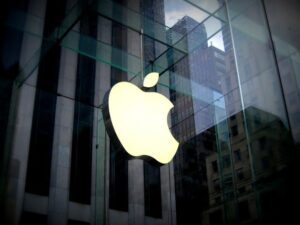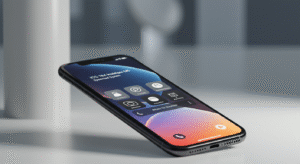At WWDC 2025, Apple finally made a full-fledged entry into the AI market.
This feature, released under the name of 'Apple Intelligence', is not just artificial intelligence. Privacy-centric personalized AIno see.
Siri has evolved into a conversational assistant, capable of everything from summarizing documents to creating images and even creating emojis.
With the addition of the partnership with ChatGPT, the Apple ecosystem becomes even stronger.
In this article, we will cover all the features and implications of Apple Intelligence. Detailed analysis based on the latest informationdo.
index
1. Apple finally steps into the AI arena
At WWDC 2025, Apple finally broke its long silence and unveiled its full-fledged AI strategy. Its name is: Apple Intelligence.
Apple has not made any notable moves in the AI field so far, but this announcement Our official newsroomAs emphasized in , “generative AI that prioritizes privacy” was put at the forefront.
In particular, this announcement is not a simple introduction of technology, but is recorded as the first case of AI being integrated across Apple's overall operating system.
Many experts say that this announcement of Apple Intelligence has a major impact on the entire Apple ecosystem. User Experience InnovationIt is evaluated as the beginning of.
2. What is Apple Intelligence?
Apple Intelligence is a generative artificial intelligence system designed by Apple that is integrated into iOS 18, iPadOS 18, and macOS Sequoia.
The biggest feature is It is a balance between on-device processing and cloud computing, while prioritizing privacy protection.
Apple is Privacy PageAs we make clear in , most AI computations are processed on the user’s device, such as an iPhone or Mac.
When complex tasks are required Private Cloud ComputeIt is calculated on the server through a proprietary system called , but this is also processed as encrypted data, so even Apple cannot know the contents.
In other words, Apple Intelligence is not simply aiming for “smart AI” but rather “trustworthy AI,” and this is the biggest difference from existing ChatGPT and Gemini.
*Will Apple Intelligence AI be applied to my iPhone? If you are curious, read the article to the end. 👇

3. Core features of Apple Intelligence
Apple Intelligence offers a variety of features, which can be broadly categorized into four categories: Text recognition and summarization, AI writing assistant, Create image, and The evolution of Siri.
3-1. Natural language processing and summary functions
Safari now has a feature that automatically summarizes web pages and organizes emails, messages, and notes into concise formats.
This feature is especially useful for increasing productivity in work or learning environments.
For example, it summarizes long emails with one click, allowing users to quickly get to the main points.
Most of this process takes place within the user's device.
3-2. Artificial Intelligence Writing Assistant
Apple also introduced a customizable sentence writing feature under the slogan “Write with Apple Intelligence.”
This feature is available within apps such as Mail, Notes, and Calendar. Rewrite (Rewrite in a different style), Proofread (Grammar Correction), Summarize (summarize) Provides functionality.
For example, you can change the message you send to a friend to be more polite, or organize a work email to be more concise.
Apple says this feature is “A tool that gives users both creativity and efficiency" is explained.
3-3. Image Creation (Image Playground & Genmoji)
Now users can directly use AI Create an emojiOr, you can create a drawing by choosing a style.
Apple has this feature Image PlaygroundIt is called and offers three styles: sketch, illustration, and animation.
Also, emojis created based on the user's photo GenmojiIt's also getting a lot of attention, as it's naturally integrated into the messaging app and keyboard.
3-4. Siri's Cataclysm
Siri is more than just a simple voice command assistant. AI assistant that can understand context and continue conversationhas evolved into .
For example, it can understand and perform commands like “Show me the attachment in the email I sent to Mom.”
It has even gotten to the point where it can change settings or execute specific functions within the app, and its natural language understanding and response speed have also improved significantly.
This is thanks to Apple Intelligence's natural language processing engine, and it's also a sign that Siri is no longer a "limited assistant."
4. Privacy-centric AI: Apple’s Difference
The point where Apple Intelligence most clearly differentiates itself from other AI platforms is It's about privacy.
Apple uses AI, but never passes user data to outside parties, and for this purpose, It is based on on-device processing.
Operations that are difficult to handle with the performance of the device Private Cloud Compute (PCC)This is handled through a new system called , which is also designed in a way that makes it impossible to identify users.
The server is managed directly by Apple and has code verification and an independent security system, making it fundamentally different from third-party AI servers.
Official Newsroom AnnouncementAccording to Apple, even if user data is collected, it is immediately destroyed after analysis and no information is linked to personal accounts.
This approach is a key element in demonstrating that Apple Intelligence is not simply “powerful AI,” but “AI that you can use with confidence.”
5. Integration with ChatGPT: Intention of the Partnership
Another highlight of WWDC 2025 is Apple's The fact that we have partnered with OpenAI's ChatGPT.
This allows users to ask ChatGPT questions via Siri or request more complex generative tasks.
The important point is that this linkage With the user's explicit consentThat is, only the activated ones are activated.
When Siri says, “I need help with ChatGPT,” the user must click OK before the request is passed on to ChatGPT.
In addition, Apple allows users to ChatGPT Plus If you log in with a paid account, you can use all the features of GPT-4o in iOS/macOS environments.
Instead of Apple building its own large language model, This can be seen as a strategy to ensure user choice by working with reliable partners.
6. Supported devices and OS versions
Apple Intelligence is expected to be available starting in the second half of 2025. iOS 18, iPadOS 18, macOS Sequoiais officially supported in .
However, it is not available on all Apple devices. There are limitations depending on device specifications.
Currently officially supported devices are:
- iPhone: iPhone 15 Pro, iPhone 15 Pro Max or later (A17 Pro or later)
- iPad: Models equipped with M1 chip or higher
- Mac: M1 or later models (requires macOS Sequoia)
Apple explains that the A17 Pro or M-series chip is essential for high-performance computing and on-device AI processing.
This decision was made to ensure both security and speed, and older devices will not be able to use features other than a simple Siri upgrade.
Full compatibility is Apple Support PageYou can check it at .

7. Reaction and Outlook
Immediately after the announcement, it was widely discussed among major IT media and users around the world. Praise and concern intersectI did it.
Some say it is “the most Apple-like interpretation of AI.” The Vergedescribed it as “the most realistic AI integration.”
However, some have pointed out that the **support scope of the function is overly limited**.
The fact that it only works on iPhone 15 Pro or later was disappointing to many users, and some experts responded, “Isn’t it too slow of a response if the official function is not activated until the second half of 2025?”
Nonetheless, it is noteworthy that Apple has made privacy and user choice a core principle of AI.
It is evaluated as a strategy that is clearly distinct from competitors such as Google's Gemini and Samsung's Gauss AI.
There are also predictions that Apple's actions could have a significant impact on **establishing the direction and ethical standards of the AI ecosystem** in the long term.
8. Conclusion: Is Apple Intelligence the Beginning of Apple-Style AI Innovation?
Apple Intelligence isn't just about introducing 'generative AI'.
Rather, it is an **embodiment of the Apple philosophy** that shows how to implement “personalized, trustworthy AI.”
At its core are the evolution of Siri, practical features like Image Playground and Genmoji, and most of all, The values of privacy and user control are clearly established.
There may be some regrets in terms of device limitations and initial response speed, but
If Apple continues to push in this direction, it will lead the future AI market. There is also ample potential to redefine the standard.
While other companies tout their speed and technological superiority, Apple is building AI slowly, carefully, but steadily.
Apple Intelligence is not just a set of features, This may be the beginning of a long-term strategy based on user trust.
*Will Apple Intelligence AI be applied to my iPhone? If you are curious, Click here!
